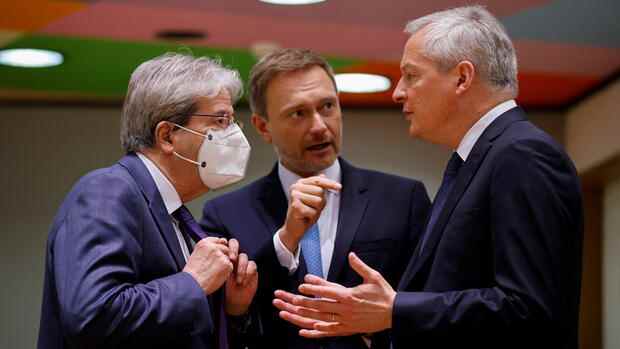Paolo Gentiloni, Christian Lindner and Bruno Le Maire in conversation.
(Photo: REUTERS)
Brussels The finance ministers of the EU countries agreed on Tuesday to introduce a CO2 border adjustment. This is a “major decision for the EU,” said French Minister Bruno Le Maire, and a “historic step forward that one can only be happy about.”
The carbon border adjustment mechanism (CBAM) is intended to make imports of energy-intensive goods more expensive. So anyone selling steel or cement to the EU should have to pay a fee. It corresponds to the CO2 tax that European companies would have to pay for the production of these goods.
Because the CO2 prices should continue to rise in the coming years and exceptions will be eliminated. This increases the risk of energy-intensive production moving abroad. Federal Finance Minister Christian Lindner (FDP) warned: “We must maintain the competitiveness of our economy in Europe, but at the same time increase our efforts in climate protection.”
It is important to Germany that Cbam is embedded in “global initiatives”. The proponents see Cbam as the first building block for a climate club, in which several states demand taxes for the CO2 emissions of their companies and then levy no border adjustment taxes on each other. The EU Commission is already seeing progress on this path. An example is the carbon price that China has introduced – albeit with few sectors and low prices.
Top jobs of the day
Find the best jobs now and
be notified by email.
According to Lindner, the instrument must also be compatible with the rules of the World Trade Organization (WTO).
Which industries have concerns
Energy-intensive industries find the protection that Cbam aims to give them insufficient. They still want to be allocated free CO2 certificates. One reason is that there is no provision in the Cbam law to subsidize exports. On the world market, European companies would therefore be at a clear disadvantage compared to their competitors.
>> Read here: BASF boss rejects state protective shield in climate protection debate
However, no details were given on Tuesday on how these issues would be resolved. According to Le Maire, a basic approach has been agreed.
For the law to come into force, the member states must agree on a final version with the European Parliament. There are already different drafts in Parliament, which differ widely so far. The Social Democrat rapporteur Mohammed Chahim has expanded the list of affected goods compared to the EU Commission’s proposal and wants to introduce the instrument as quickly as possible.
According to the original proposal by the Brussels authorities, the goods iron, steel, cement, fertilisers, aluminum and electricity should be included. Chahim wants to add hydrogen, plastic and aluminum. The German MP Peter Liese (CDU), on the other hand, wants to take several security measures in the event that energy-intensive companies get into trouble despite Cbam.
More on this: Final sprint for the CO2 border adjustment – steel industry fears migration
